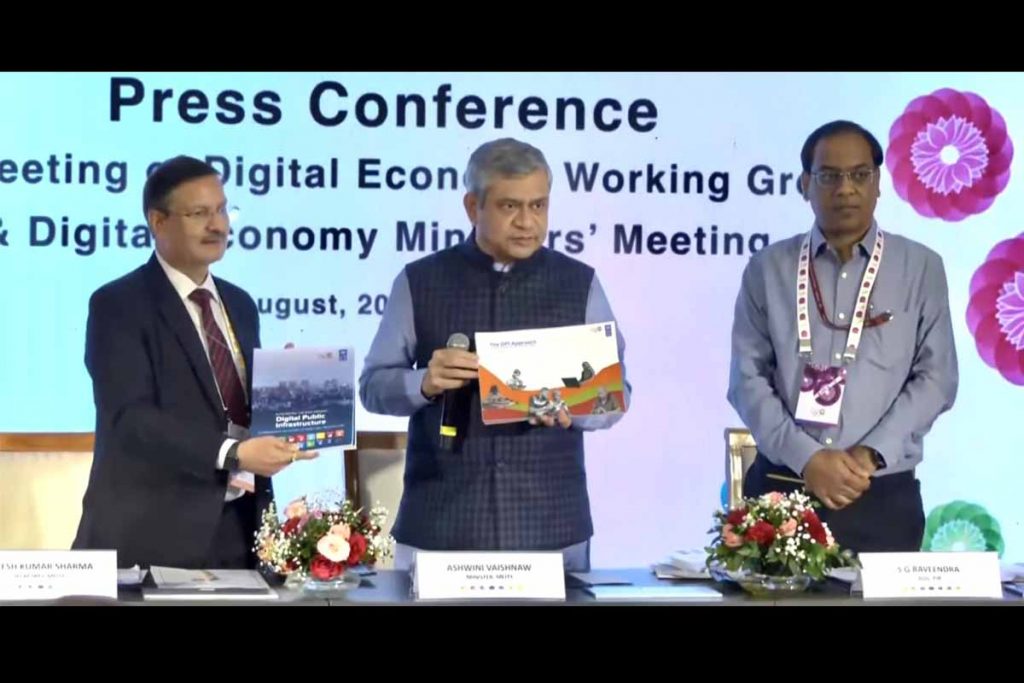In a historic move, under India’s Presidency, G20 Digital Economy Ministers reached a groundbreaking consensus on how to effectively shape digital public infrastructure (DPI) of the future, as an accelerator of the Sustainable Development Goals (SDGs). The United Nations Development Programme (UNDP) with the World Bank collaborated[VD1] with the Government of India as its knowledge partner on DPI in the Digital Economy Working Group.
In a special message during the Digital Economy Ministerial Meeting, Honourable Prime Minister of India, Mr. Narendra Modi, spoke about “unshakable belief of India in innovation, speedy implementation of DPI, modulated by spirit of inclusion – leaving no one behind.”
For the first time, a description of DPI has been collectively adopted by a group of countries, as a set of shared digital systems that should be secure and interoperable, that can be built on open standards and promote access to services for all, with governance and community as core components of DPI. A set of high-level guiding principles for DPI has also been endorsed that promote (among other things) governance of DPI for public benefit, trust and transparency as an inherent aspect of DPI.
The G20 India Presidency in partnership with UNDP launched two knowledge products on DPI to help countries advance their digital transformation journey, with speed, at scale and inclusion. These were launched by the Honourable Minister of Electronics & Information Technology, Government of India, Mr. Ashwini Vaishnaw. The DPI SDG Compendium presents a global snapshot of the potential and impact of DPI across all 17 SDGs, and the DPI Playbook provides practical resources on how countries can go about building their inclusive and rights-based DPI.
“These first-of-their-kind public resources can assist countries to build their DPI, and help to ensure that all communities, everywhere, can reap the many benefits of our burgeoning digital world. We hope that these resources will inspire countries to consider the many possibilities that DPI can offer as a means to accelerate progress on the SDGs,” said Achim Steiner, UNDP Administrator.
The resources are being released ahead of the 78th UN General Assembly and the SDG Action Weekend where DPI is a key priority on the UN Secretary General’s agenda.
Coupled with the growing demand for DPI, leaders at the meeting also acknowledged challenges related to DPI financing, particularly in low- and middle-income countries. The way forward requires embracing global multi-stakeholder approaches to build capacity, as well as provide technical assistance and adequate funding support.
In this regard, the G20 Digital Ministers also welcomed the ‘One Future Alliance’ (OFA) – a voluntary initiative proposed by the G20 India Presidency with support from UNDP and its knowledge partners. It aims to bring together governments, the private sector, academic and research institutions, donor agencies, civil society organizations and other relevant stakeholders and existing mechanisms to synergize global efforts in the DPI ecosystem
UNDP is grateful to the Ministry of Electronics and IT, Government of India for this partnership under its G20 Presidency. We also thank the Bill & Melinda Gates Foundation, Omidyar Network India, the Centre for Digital Public Infrastructure, Aapti Institute, Dalberg, and the Boston Consulting Group for their support.
